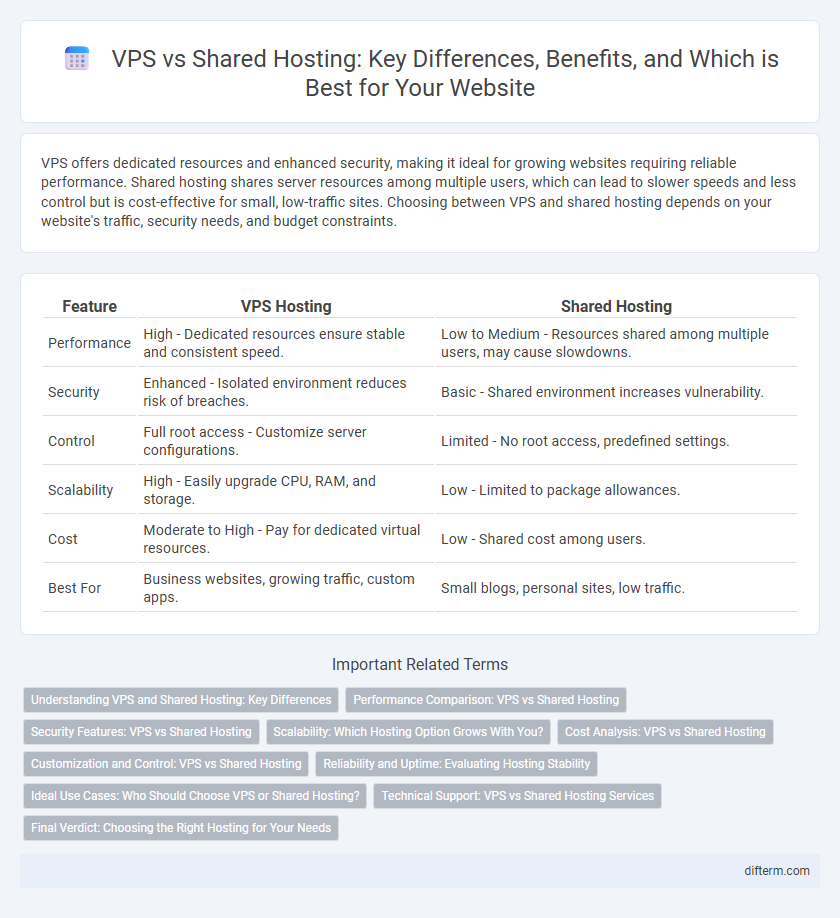VPS offers dedicated resources and enhanced security, making it ideal for growing websites requiring reliable performance. Shared hosting shares server resources among multiple users, which can lead to slower speeds and less control but is cost-effective for small, low-traffic sites. Choosing between VPS and shared hosting depends on your website's traffic, security needs, and budget constraints.
Table of Comparison
| Feature | VPS Hosting | Shared Hosting |
|---|---|---|
| Performance | High - Dedicated resources ensure stable and consistent speed. | Low to Medium - Resources shared among multiple users, may cause slowdowns. |
| Security | Enhanced - Isolated environment reduces risk of breaches. | Basic - Shared environment increases vulnerability. |
| Control | Full root access - Customize server configurations. | Limited - No root access, predefined settings. |
| Scalability | High - Easily upgrade CPU, RAM, and storage. | Low - Limited to package allowances. |
| Cost | Moderate to High - Pay for dedicated virtual resources. | Low - Shared cost among users. |
| Best For | Business websites, growing traffic, custom apps. | Small blogs, personal sites, low traffic. |
Understanding VPS and Shared Hosting: Key Differences
VPS (Virtual Private Server) hosting allocates dedicated resources within a virtualized server environment, ensuring enhanced performance, security, and scalability compared to shared hosting, where multiple websites share the same server resources. Shared hosting suits small websites with low traffic due to its cost-effectiveness, while VPS supports higher traffic volumes and resource-intensive applications by providing isolated environments. Understanding these distinctions helps businesses select hosting services aligned with their performance requirements and growth plans.
Performance Comparison: VPS vs Shared Hosting
VPS hosting provides dedicated resources such as CPU, RAM, and storage, ensuring faster load times and consistent performance compared to shared hosting, where server resources are distributed among multiple users. VPS environments offer scalable infrastructure that adapts to traffic spikes without impacting website speed, unlike shared hosting which often experiences slowdowns during high traffic periods. Key performance metrics like uptime, response time, and resource allocation significantly favor VPS hosting, making it ideal for websites requiring reliability and speed.
Security Features: VPS vs Shared Hosting
VPS hosting offers enhanced security features by providing isolated server environments and dedicated resources, reducing risks of cross-site vulnerabilities common in shared hosting. Shared hosting exposes multiple users to the same server, increasing susceptibility to malware and cyberattacks due to resource and security setting overlaps. Advanced firewall configurations, customized security protocols, and root access in VPS significantly improve protection compared to the standardized, limited security measures in shared hosting.
Scalability: Which Hosting Option Grows With You?
VPS hosting offers superior scalability by allocating dedicated resources that can be easily adjusted as your website traffic and resource demands increase. Shared hosting provides limited scalability since server resources are shared among multiple users, often resulting in performance bottlenecks during traffic spikes. For businesses anticipating rapid growth or fluctuating traffic, VPS is a more flexible and reliable choice to ensure consistent website performance.
Cost Analysis: VPS vs Shared Hosting
Shared hosting offers a lower upfront cost, making it ideal for small websites with limited budgets, whereas VPS hosting involves higher initial expenses due to dedicated resources and advanced features. Over time, VPS can provide better value through enhanced performance, scalability, and security, reducing potential downtime costs and technical issues common in shared environments. Businesses must weigh the predictable monthly fees of shared hosting against the flexible, resource-rich plans of VPS to determine the most cost-effective solution for their growth and traffic demands.
Customization and Control: VPS vs Shared Hosting
VPS hosting provides extensive customization and control by allowing users to configure server settings, install custom software, and allocate dedicated resources, unlike shared hosting which restricts these capabilities due to resource sharing among multiple users. With VPS, businesses can optimize performance and security tailored to specific applications, while shared hosting limits access to core server configurations and software installations. This enhanced control in VPS environments is crucial for developers and enterprises requiring scalable and flexible hosting solutions.
Reliability and Uptime: Evaluating Hosting Stability
VPS hosting offers superior reliability and uptime compared to shared hosting due to dedicated server resources and isolated environments, minimizing downtime caused by other users. Shared hosting often suffers from resource contention, leading to inconsistent performance and potential outages during traffic spikes. Businesses requiring consistent availability should prioritize VPS for its stable infrastructure and higher uptime guarantees.
Ideal Use Cases: Who Should Choose VPS or Shared Hosting?
VPS hosting is ideal for businesses or developers requiring greater control, dedicated resources, and scalability for growing websites or applications with medium to high traffic volumes. Shared hosting suits small websites, blogs, or startups with limited budgets and low to moderate traffic, offering ease of use with managed server maintenance. Companies anticipating rapid growth or needing custom software environments should opt for VPS, while those prioritizing affordability and simplicity are better served by shared hosting.
Technical Support: VPS vs Shared Hosting Services
VPS hosting offers dedicated technical support tailored to server-level issues, providing faster response times and more specialized assistance compared to shared hosting. Shared hosting support typically handles general website troubleshooting with limited access to server configurations, making it less effective for advanced technical problems. Enhanced technical support in VPS ensures better server management and uptime, critical for businesses requiring reliable and customizable hosting environments.
Final Verdict: Choosing the Right Hosting for Your Needs
VPS hosting provides dedicated resources and greater control, making it ideal for growing websites requiring enhanced performance and security. Shared hosting offers a cost-effective solution for small websites and startups with lower traffic and limited technical needs. Choosing the right hosting depends on your website's scalability, budget, and technical expertise, with VPS suited for advanced users and shared hosting for beginners.
VPS vs shared hosting Infographic

 difterm.com
difterm.com